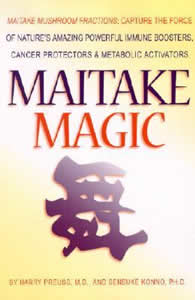According to researches, polysaccharide complexes present in maitake mushrooms appear to have important anti-cancer effect. Polysaccharides such as beta-glucans found in a number of medicinal mushrooms are increasingly being recognized for their non-specific immunomodulatory activities. Beta glucan is considered to stimulate the immune system and activate certain cells and proteins that attack cancer, including macrophages, T-cells, natural killer cells, and interleukin-1 and -2.The end result is an increased defense against cancer.
Maitake and Cancer Researches
Maitake showed antitumor activities, decreased doxorubicin toxicity, and inhibited tumor metastasis in vitro. In a study, scientists exposed mice to a known urinary bladder carcinogen BBN (N-butyl-N’-butanolnitrosoamine); every day for 8 weeks and then fed them mushrooms, including oyster, shiitake, and maitake mushrooms. All 10 mice treated only with BBN developed bladder carcinoma. Mushroom feeding significantly reduced the number of bladder cancers, with maitake mushroom being the most effective. Carcinomas were observed in 46% of the maitake treated mice compared to 52% and 65% for shiitake and oyster, respectively. In a study of 165 patients, findings showed that quality of life indicators had improved. Of these patients, 90% reported an improvement in cancer-therapy symptoms and 83% reported pain decrease. Combination treatment with vitamin C and maitake mushroom increases effectiveness of cancer treatments, according to a study reported in the July 2009 edition of the International Journal of General Medicine.
Maitake mushroom and the maitake D-fraction prepared from them contain a type of polysaccharide, called beta glucan. D-Fraction, has been reported to exhibit an antitumor activity through activation of immunocompetent cells, including macrophages and T cells, with modulation of the balance between T-helper 1 and 2 cells. Unlike many other mushroom extracts that have to be injected intravenously.
 Maitake D-fraction has powerful ability to potentiate and activate the cellular immune system. In a study of maitake cancer-preventive, 20 five-week-old mice were injected once with a carcinogenic substance. Beginning on the fifteenth day after injection, 10 mice were fed 0.2 mg of maitake D-fraction for 15 consecutive days. The other 10 received saline solution. After 30 days the number of mice with cancer was 30% percent in the maitake group and 93% in the control group. A study reported the Annals of the New York Academy of Science in 1995 found that when injected into rats, maitake D-fraction healed the function of the immune system. A 1997 study reported in the “Annals of the New York Academy of Science” found that maitake D-fraction was able to enhance the immune system and inhibit the spread of tumors in mice implanted with breast cancer. Maitake D-fraction, demonstrated anti-cancer effect against a line of human breast cancer cells in the tissue culture study, reported in the June 2011 Journal of Medicinal Food.
Maitake D-fraction has powerful ability to potentiate and activate the cellular immune system. In a study of maitake cancer-preventive, 20 five-week-old mice were injected once with a carcinogenic substance. Beginning on the fifteenth day after injection, 10 mice were fed 0.2 mg of maitake D-fraction for 15 consecutive days. The other 10 received saline solution. After 30 days the number of mice with cancer was 30% percent in the maitake group and 93% in the control group. A study reported the Annals of the New York Academy of Science in 1995 found that when injected into rats, maitake D-fraction healed the function of the immune system. A 1997 study reported in the “Annals of the New York Academy of Science” found that maitake D-fraction was able to enhance the immune system and inhibit the spread of tumors in mice implanted with breast cancer. Maitake D-fraction, demonstrated anti-cancer effect against a line of human breast cancer cells in the tissue culture study, reported in the June 2011 Journal of Medicinal Food.
The most last development is the MD-fraction, a proprietary maitake extract its Japanese researchers consider to be a notable advance upon the preceding D-fraction. The D-fraction, the MD-fraction, and other extracts, frequently in combination with whole maitake powder, have shown especially promise as immunomodulating agents, and as an adjunct to cancer treatment. Maitake MD-fraction containing beta-1,6 glucan with beta-1,3 branched chains has previously exhibited potent anticancer effect by increasing immune-competent cell activity. In a study; cancer regression or significant symptom improvement was observed in 58% of liver cancer patients, 62% of lung cancer patients, and 68% of breast cancer patients.
Leave a Reply